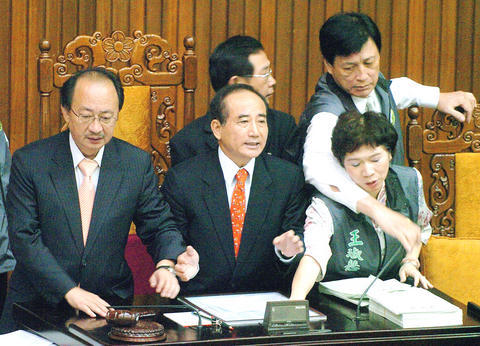The consumer debt clearance regulations (
With the regulation, cardholders having unsecured debts or non-preferential debts of less than NT$12 million (US$360,000) can go to court to negotiate a repayment plan and method for rehabilitation, while those unable to pay back their debts can apply for bankruptcy.
But the regulation stipulates that debtors can only seek assistance from the courts if they fail to personally negotiate a payback plan with banks.

PHOTO: CHANG CHIA-MING, TAIPEI TIMES
The Financial Supervisory Commission (FSC), in charge of banking, said that 227,000 people had applied for the special debt-relief mechanism by the end of March, under which they were granted lower interest rates and longer payback periods.
The total number of indebted credit and cash cardholders nationwide is estimated to be 500,000, if borrowers outside the mechanism are included.
To prevent debtors from reneging on payback plans, the regulation states that debtors covered by the mechanism cannot apply for either rehabilitation or bankruptcy.
Exceptions are allowed if debtors are unable to comply with their plan through no fault of their own.
Debtors applying for rehabilitation or bankruptcy will be subject to certain restrictions. The regulation states that the courts are entitled to require debtors in rehabilitation to live frugally and can revoke their rehabilitation if they violate the requirements of their payback plan.
Those who are declared bankrupt would be barred from taking 175 kinds of jobs, most of them financial in nature, and would be barred from being civil servants for seven years.
Bankrupt individuals would also be prohibited from traveling abroad, taking taxis, eating expensive dinners or buying luxury goods.
If they are found to be purposely hiding properties or transferring assets to others, or living a luxurious lifestyle during the bankruptcy period, the court would be entitled to have them detained.
The extent of the consumer debt problem became apparent in the summer of 2005 and was blamed on the failure of banks to perform strict credit reviews when issuing new cards.
"Since the draft regulations were sent to the legislature last April, the banking sector has not stopped lobbying to try and block them," said Lin Feng-jeng (林峰正), president of the Judicial Reform Foundation.
Consensus on controversial articles was finally achieved on Thursday during negotiations attended by representatives from The Bankers Association of Taiwan, ROC, debt-relief activists, government officials and three legislators.
They were the Democratic Progressive Party Legislator Ker Chien-ming (
One of the biggest controversies was the initial provision that prohibited creditor banks from putting debtors' residences up for auction if they got into arrears on their mortgages during the rehabilitation period, which can last from six to eight years.
As the banks refused to make concessions, the provision was struck from the regulations, but a resolution was attached that demands banks include the spirit of the provision into their standard contracts when issuing mortgages.
Shyu, the main advocator of the regulations, said that the debtor side also gave up on a provision that would have allowed debtors in rehabilitation to only pay interest on their mortgages in exchange for the passage of the regulations.
"The nation has mortgages totalling NT$4.8 trillion. We had to consider the consequences the two provisions would cause banks in terms of unrecoverable debt," Ker said.
The regulations will become effective nine months after the president promulgates them.
In related news, lawmakers yesterday put a proposal to reinstate the controversial 18-percent preferential interest rate on the savings of retired civil servants, military officials and teachers on hold.
The pan-blue dominated legislature last December abolished a plan put into effect by the Examination Yuan in February last year that the government branch in charge of the country's civil service said would rationalize the retirement system.
The DPP asked for a reconsideration of the abolition ruling and the request was scheduled to be tackled in yesterday's plenary session, but the speaker decided to skip the issue.
Calling the KMT's effort a move that would stir up "widespread indignation and discontent," Wang urged the KMT to offer the public an apology for trying to force the bill through.
ADDITIONAL REPORTING BY FLORA WANG
Also see story:
Bankruptcy bill passed by legislature

A strong continental cold air mass is to bring pollutants to Taiwan from tomorrow, the Ministry of Environment said today, as it issued an “orange” air quality alert for most of the country. All of Taiwan except for Hualien and Taitung counties is to be under an “orange” air quality alert tomorrow, indicating air quality that is unhealthy for sensitive groups. In China, areas from Shandong to Shanghai have been enveloped in haze since Saturday, the ministry said in a news release. Yesterday, hourly concentrations of PM2.5 in these areas ranged from 65 to 160 micrograms per cubic meter (mg/m³), and pollutants were

Taiwan’s armed forces have established response protocols for a wide range of sudden contingencies, including the “Wan Chun Plan” to protect the head of state, the Ministry of Defense (MND) said today. After US President Donald Trump on Saturday launched a series of airstrikes in Venezuela and kidnapped Venezuelan President Nicolas Maduro, concerns have been raised as to whether China would launch a similar “decapitation strike” on Taiwan. The armed forces regularly coordinate with relevant agencies and practice drills to ensure preparedness for a wide range of scenarios, Vice Minister of National Defense Hsu Szu-chien (徐斯儉) told reporters before a

EVA Airways on Saturday said that it had suspended a pilot and opened an investigation after he allegedly lost his temper and punched the first officer several times as their plane was taxiing before takeoff at Los Angeles International Airport. According to a report published on Thursday by The Reporter, the incident occurred after the flight’s Malaysian first officer tried to warn the Taiwanese pilot, surnamed Wen (文), that he was taxiing faster than the speed limit of 30 knots (55.6kph). After alerting the pilot several times without response, the first officer manually applied the brakes in accordance with standard operating

The New Taipei City Social Welfare Department on Thursday celebrated Paralympic competitor Chen Tzu-wei (張孜維), who received last year’s national Golden Eagle award for exemplary achievement by Taiwanese with disabilities. Chen, who suffers from childhood-onset muscular dystrophy, did not attend the first award ceremony held by the Ministry of Health and Welfare in November due to illness. Chen was formally presented with the award at the department, where he gave thanks to government workers for supporting his education and livelihood, the department said in a statement. Chen was raised by the Ai-hsin Home for Persons with Disabilities in the city’s Bali District (八里)